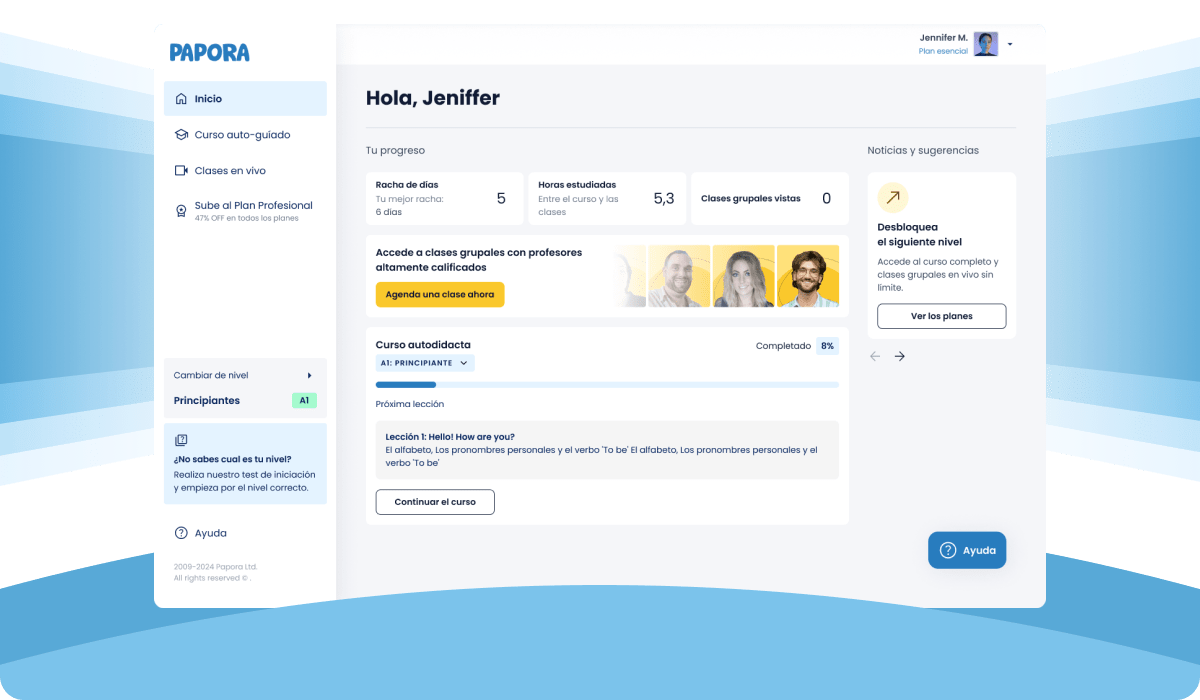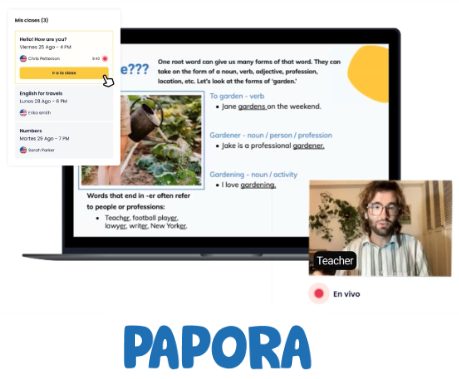Starting to learn a language will always be a challenge. There's so much to discover and so much content to behold, even more so when it comes to learning English.
However, while it can be a long journey, it doesn't have to be overwhelming. That's why we've created this article for you with everything you need to learn English from scratch.
What do you need to start learning English?
You don’t need much to learn English—even if you’re in a hurry. The key is having the motivation to start; everything else simply makes the process easier.
Begin with a clear goal that gives you a reason to learn, then choose a method that fits your path. An internet connection will be your most powerful tool, along with a few books, guidance, and possibly a course or teacher to support your progress.
Start speaking English from day one
At Papora, you'll find everything you need to start your learning and much more. Don't put it off.
Start now

The 8 steps to start learning English
First of all, you should keep in mind why learning English is so important. This will help you better understand the following information and keep you aware of why you should learn English.
The English language ranks first in terms of international importance, as it is the most widely spoken language globally and, above all, is very useful in different contexts.
1. Find a method
Choosing the right method will save you from getting lost in endless internet content. That’s why it’s important to find one that truly fits your needs.
Papora is a great option for everyone—whether you’re just starting out or already at an advanced level. Its self-guided course feels like a game, where you learn at your own pace by seeing, hearing, and writing words tied to each lesson.
But what makes Papora stand out is the unlimited live classes with native-level teachers. You’ll practice with real experts, in interactive lessons that simulate real-life situations—making learning natural, fun, and effective.
If you're just starting out, top-rated beginner English books can also be a great way to supplement your learning and reinforce key concepts.

2. Get motivated
Beyond the methods, tricks, or tips you discover, the real magic of learning English lies in your inner resources to keep you going.
“Transform that phrase you probably unconsciously repeat to yourself from "I need to learn English" to "I want to learn English." When you open yourself up to this, you'll discover that the English language is not only practical, but also beautiful, fun, and entertaining. Then you'll begin to enjoy learning, and when you enjoy learning, you keep doing it, and when you keep doing something, you get better at it.”
Staying motivated is key to keeping a steady study routine and speeding up your progress. A great way to do this is by enjoying your favorite content—but in English.
You can also boost your motivation by telling friends and family about your learning journey and asking them to check in on your progress.
And if you know someone who already speaks English, practice by having regular conversations with them—it’s one of the most effective ways to stay engaged and improve.
3. Make a plan
One of the most important strategies is to structure an English study plan based on what you already have.
Organize your day, create dedicated timetables for studying English, whether it's taking one-on-one lessons with a teacher or taking a course, make to-do lists, and do everything else you need to stay organized.

By doing this, you’ll avoid constant distractions, keep from feeling overwhelmed, and make learning English just another easy part of your day.
4. Start with the basics
Learning English from scratch is like starting any language; you must start with the basics.
Think about children and how they are taught to speak, write, and read. They first learn the alphabet and numbers, and little by little, they identify vocabulary and repeat the sounds of words they learned from their parents, from television series, or at school.
“I highly recommend taking classes and learning the basics (parts of speech, verbs, tenses, etc., to start) and then go from there. While learning, be sure to practice English by reading short texts, watching movies, and chatting with people in English.”
No matter your age, learning a language always starts with the basics. If you’re unsure where to begin, this beginner English learning guide gives you a simple roadmap, so you focus on the core building blocks, like useful vocabulary and basic grammar, and start forming sentences sooner.
Later on, tackling advanced topics like the past participle will help you take your English to the next level.

5. Set goals
When we're just starting out learning English and we're experiencing a bit of everything, it's easy to lose direction and motivation, perhaps because we're still in the process of gathering knowledge to speak confidently. That's why setting goals is essential.
“Setting learning goals is very important to help you stay on track. Look for fun ways to learn English, such as immersion, and remember to talk, talk, and talk some more—because conversation is key!”
Define short-, medium-, and long-term goals, think about your plan, and use it as a driving force. It can help to follow a 3-month English learning plan that keeps you progressing steadily during your first months of study.
For example, you can create a dream map and set a short-term goal of finding some native-speaking friends to help you with your pronunciation, so that in the medium or long term you can go on an exchange trip to English-speaking countries and become fluent in your conversation.

Remember that your goals will always depend on your needs. If your priority is to learn English in a few days because you're going on a trip to the United States to do some shopping, your goals will be completely different from those of someone who has plenty of time to study the language.
6. Separate by subject area
It doesn’t matter where you’re studying—online, from books, or on your own—the key is to organize the areas of English you practice. By separating grammar, vocabulary, verbs (like the negative of “to be”), and pronunciation, you’ll make steady progress and see how everything connects.
A simple trick is to dedicate a different day of the week to each area and use one day just to review what you’ve learned.

While doing exercises, you’ll naturally touch on different areas at the same time—but separating them helps you keep things clear and manageable. On your practice day, you can play around with making sentences that mix the pronouns, verbs, and words you’ve learned, putting grammar into action in a fun way.
7. Consume content in English (even if you don't understand anything)
When starting a new language, the key is to immerse yourself in as much content as possible.
Fortunately, with English, you’ll never run out of options—there are thousands to explore.
“I call it background learning. In addition to classroom lessons, online lessons, books, or apps, listen to the radio in English, read the lyrics of your favorite music in English, and watch TV and YouTube videos in English. Remember, it doesn't matter if you don't understand everything. It's about getting used to hearing the sounds and rhythms of English. Little by little, you'll recognize more and more words.”
At first, you probably won’t understand much with this method, so it’s best to start by using Spanish subtitles when watching movies or series. Many YouTube videos also include this option.
The idea is to gradually recognize Spanish words in their English form, see how certain verbs are used, and notice that the sounds native speakers make aren’t so different from those in Spanish.
If you enjoy reading, you can look for online articles—like those on BBC World—or pick up a book you’re interested in. If reading isn’t your thing, you could even switch your favorite video games to English. The key is to stay surrounded by the language as much as possible and pick up new words every day.

8. Invest in your knowledge
Whether at the beginning of your journey or once you’ve reached a more advanced level, investing in your learning is always worthwhile. Fully online English courses like Papora, textbooks, webinars, or even traveling to English-speaking countries to interact with native speakers are excellent ways to enrich your progress.
Of course, true results also require investing your time, effort, and dedication.
Time is subjective
There’s no fixed timeframe for learning English—it depends on your goals, the effort you put in, and the type of content you engage with.
For example, listening to songs in English can help, but if that’s all you do for just a few hours, you won’t reach fluency.
Our recommendation: dedicate as much time as your schedule allows (the more, the better) and immerse yourself in the language as much as possible.

Frequently asked questions about learning English
It takes much less than you think; you must start with a willingness, goals, a plan, a reliable source, an English course like Papora, and a good internet connection to research as much information as possible.
Remember that they will depend on you and how you want to pursue them, but initially you'll need a method, motivation, a plan, basic topics to follow, clear objectives, knowledge of the main areas, content consumption in English, and investment in your knowledge with courses like Papora.







